六年级英语毕业总复习--动词
六年级下册英语期末复习-动词适当形式填空讲解及训练-教科版(含答案)
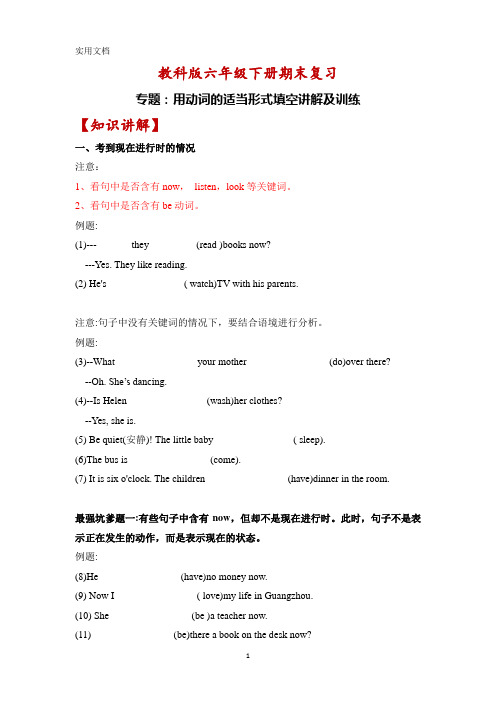
教科版六年级下册期末复习专题:用动词的适当形式填空讲解及训练【知识讲解】一、考到现在进行时的情况注意:1、看句中是否含有now,listen,look等关键词。
2、看句中是否含有be动词。
例题:(1)---_______they_________ (read )books now?---Yes. They like reading.(2) He's_______________ ( watch)TV with his parents.注意:句子中没有关键词的情况下,要结合语境进行分析。
例题:(3)--What________________ your mother________________ (do)over there?--Oh. She’s dancing.(4)--Is Helen________________(wash)her clothes?--Yes, she is.(5) Be quiet(安静)! The little baby________________( sleep).(6)The bus is________________ (come).(7) It is six o'clock. The children________________ (have)dinner in the room.最强坑爹题一:有些句子中含有now,但却不是现在进行时。
此时,句子不是表示正在发生的动作,而是表示现在的状态。
例题:(8)He________________ (have)no money now.(9) Now I________________ ( love)my life in Guangzhou.(10) She________________ (be )a teacher now.(11)________________ (be)there a book on the desk now?二、考到一般现在时的情况注意:1、判断句中是否含有usually,often,never,every等关键词。
小学六年级英语总复习

小学英语毕业词汇归类表一.学习用品(school things):pen钢笔pencil铅笔pencil-case铅笔盒ruler尺子book书bag包comic book漫画书post card明信片newspaper报纸schoolbag书包eraser橡皮crayon蜡笔sharpener卷笔刀story-book故事书notebook笔记本Chinese book语文书English book英语书math book数学书magazine杂志dictionary词典二.人体(body):foot脚head头face脸hair头发nose鼻子mouth嘴eye眼睛ear 耳朵arm手臂hand手finger手指leg腿tail尾巴三.颜色(colours):red红blue蓝yellow黄green绿white白black黑pink粉红purple紫orange橙brown棕四.动物(animals):cat猫dog狗pig猪duck鸭rabbit兔horse马elephant大象ant 蚂蚁fish鱼bird鸟eagle鹰beaver海狸snake蛇mouse老鼠squirrel松鼠kangaroo 袋鼠monkey猴panda熊猫bear熊lion狮子tiger老虎fox狐狸zebra斑马deer鹿giraffe长颈鹿goose鹅hen母鸡turkey火鸡lamb小羊sheep绵羊goat山羊cow奶牛donkey驴squid鱿鱼lobster龙虾shark鲨鱼seal海豹sperm whale抹香鲸killer whale 虎鲸五.人物(people):friend朋友boy男孩girl女孩mother母亲father父亲sister姐妹brother兄弟uncle叔叔;舅舅man男人woman女人Mr.先生Miss小姐lady女士;小姐mom妈妈dad爸爸parents父母grandparents祖父母grandma/grandmother(外)祖母grandpa/grandfather(外)祖父aunt姑姑cousin堂(表)兄弟;堂(表)姐妹son儿子daughter 女儿baby婴儿kid小孩classmate同学queen女王visitor参观者neighbour邻居principal校长university student大学生pen pal笔友tourist旅行者people人物robot机器人六.职业(jobs):teacher教师student学生doctor医生nurse护士driver司机farmer 农民singer歌唱家writer作家actor男演员actress女演员artist画家TV reporter电视台记者engineer工程师accountant会计policeman(男)警察salesperson销售员cleaner 清洁工baseball player棒球运动员assistant售货员police警察七.食品,饮料(food、drink):rice米饭bread面包beef牛肉milk牛奶water水egg 蛋fish鱼tofu豆腐cake蛋糕hot dog热狗hamburger汉堡包French fries炸薯条cookie曲奇biscuit饼干jam果酱noodles面条meat肉chicken鸡肉pork猪肉mutton 羊肉vegetable蔬菜salad沙拉soup汤ice冰ice-cream冰淇淋Coke可乐juice果汁tea茶coffee咖啡breakfast早餐lunch午餐dinner/supper晚餐meal一餐八.水果,蔬菜(fruit & vegetables):apple苹果banana香蕉pear梨orange橙watermelon西瓜grape葡萄eggplant茄子green beans青豆tomato西红柿potato土豆peach桃strawberry草莓cucumber黄瓜onion洋葱carrot胡萝卜cabbage卷心菜九.衣服(clothes):jacket夹克衫shirt衬衫T-shirt丅恤衫skirt短裙子dress连衣裙jeans牛仔裤pants长裤socks袜子shoes鞋子sweater毛衣coat上衣raincoat雨衣shorts短裤sneakers网球鞋slippers拖鞋sandals凉鞋boots靴子hat(有沿的)帽子cap 便帽sunglasses太阳镜tie领带scarf围巾gloves手套trousers裤子cloth布十.交通工具(vehicles):bike自行车bus公共汽车train火车boat小船ship轮船yacht快艇car小汽车taxi出租车jeep吉普车van小货车;面包车plane/airplane飞机subway/underground地铁motor cycle摩托车十一.杂物(other things):window窗户door门desk课桌chair椅子bed床computer计算机board写字板fan风扇light灯teacher's desk讲台picture图画;照片wall墙壁floor地板curtain窗帘trash bin垃圾箱closet壁橱mirror镜子end table床头柜football/soccer足球present礼物walkman随身听lamp台灯phone电话sofa沙发shelf书架fridge冰箱table桌子TV电视air-conditioner空调key钥匙lock锁photo照片chart图表plate盘子knife刀fork叉spoon勺子chopsticks筷子pot锅gift礼物toy 玩具doll洋娃娃ball球balloon气球kite风筝jigsaw puzzle拼图游戏box盒子umbrella 伞zipper拉链violin小提琴yo-yo溜溜球nest鸟窝hole洞tube管子toothbrush牙刷menu菜单e-card电子卡片e-mail电子邮件traffic light交通灯money钱medicine药十二.地点(locations):home家room房间bedroom卧室bathroom卫生间living room起居室kitchen厨房classroom教室school学校park公园library图书馆post office邮局police office警察局hospital医院cinema电影院bookstore书店farm农场zoo动物园garden花园study书房playground操场canteen食堂teacher's office教师办公室library图书馆gym体育馆washroom卫生间art room绘画教室computer room 计算机教室music room音乐教室TV room电视机房flat公寓company公司factory工厂fruit stand水果摊pet shop宠物商店nature park自然公园theme park主题公园science museum科学博物馆the Great Wall长城supermarket超市bank银行country 国家village乡村city城市hometown家乡bus stop公交车站十三.课程(classes): sports体育运动science科学Moral Education思想品德课Social Studies社会课Chinese语文math数学PE体育课English英语课十四.国家,城市(countries & cities):China/PRC中国America/USA美国UK联合王国England英国Canada/CAN加拿大Australia澳大利亚New York纽约London伦敦Sydney悉尼Moscow莫斯科Cairo开罗十五.气象(weather):cold寒冷的warm温暖的cool凉爽的snowy下雪的sunny晴朗的hot炎热的rainy下雨的windy有风的cloudy多云的weather report天气预报十六.景物(nature):river河流lake湖泊stream河;溪forest森林path小道road公路house房子bridge桥building建筑物rain雨cloud云sun太阳mountain山sky天空rainbow彩虹wind风air空气moon月亮十七.植物(plants): flower花grass草tree树seed种子sprout苗plant植物rose 玫瑰leaf叶子十八.星期(week):Monday星期一Tuesday星期二Wednesday星期三Thursday星期四Friday星期五Saturday星期六Sunday星期天weekend周末十九.月份(months):Jan. (January)一月Feb.(February)二月Mar.(March)三月April 四月May五月June六月July七月Aug.(August)八月Sept.(September)九月Oct.(October)十月Nov.(November)十一月Dec.(December)十二月二十.季节(seasons):spring春summer夏fall/autumn秋winter冬二十一.方位(directions):south南north北east东west西left 左边right右边二十二.患病(illness):have a fever发烧hurt疼痛have a cold感冒have a toothache牙疼have a headache头疼have a sore throat喉咙疼二十二.数词(numbers):one一two二three三four四five五six六seven七eight 八nine九ten十eleven十一twelve十二thirteen十三fourteen十四fifteen十五sixteen十六seventeen十七eighteen十八nineteen十九twenty二十thirty三十forty 四十fifty五十sixty六十seventy七十eighty八十ninety九十forty-two四十二hundred 百one/a hundred and thirty-six一百三十六first第一second第二third第三fourth第四fifth第五eighth第八ninth第九twelfth第十二twentieth第二十thirtieth第三十fortieth 第四十fiftieth第五十sixtieth第六十seventieth第七十eightieth第八十ninetieth第九十fifty-sixth第五十六二十三.形容词(adj.):big大的small小的long长的tall高的short短的;矮的young 年轻的old旧的;老的strong健壮的thin瘦的active积极活跃的quiet安静的nice好看的kind和蔼亲切的strict严格的smart聪明的funny滑稽可笑的tasty好吃的sweet甜的salty咸的sour酸的fresh新鲜的favourite最喜爱的clean干净的tired疲劳的excited兴奋的angry生气的happy高兴的bored无聊的sad忧愁的taller更高的shorter更矮的stronger更强壮的older年龄更大的younger更年轻的bigger更大的heavier更重的longer更长的thinner更瘦的smaller更小的good好的fine好的great 很好的heavy 重的new新的fat胖的happy快乐的right对的hungry饥饿的cute逗人喜爱的little小的lovely可爱的beautiful漂亮的colourful色彩鲜艳的pretty漂亮的cheap便宜的expensive昂贵的juicy多汁的tender嫩的healthy健康的ill有病的helpful有帮助的high高的easy简单的proud骄傲的sick有病的better更好的higher 更高的二十四.介词(prep.): in在……里on在……上;在……时候under在……下面near 在……的旁边behind在……后边next to与……相邻over在……上面in front of在……前面二十五.代词(pron.): I我we我们you你;你们he他she她it它they他(她,它)们my 我的our 我们的your你的;你们的his他的her她的二十六.动词(v.):play(played)玩;踢swim(swam)游泳skate滑冰fly(flew)飞jump跳walk走run(ran)跑climb爬fight打架swing(swung)荡eat(ate)吃sleep睡觉like像,喜欢have(had)有;吃turn转弯buy(bought)买take(took)买;带live居住teach(taught)教go(went)去study(studied)学习learn学习sing(sang)唱歌dance跳舞row划do(did)做do homework做作业do housework做家务watch TV看电视read(read)books读书cook the meals做饭water the flowers浇花sweep(swept)the floor扫地clean the bedroom打扫卧室make(made)the bed铺床set(set)the table摆饭桌wash the clothes洗衣服do the dishes洗碗碟use a computer使用计算机do morning exercises晨练;做广播操eat breakfast吃早饭eat dinner吃晚饭go to school上学have English class上英语课play sports进行体育运动get(got)up起床climb mountains爬山go shopping买东西play the piano弹钢琴visit grandparents看望(外)祖父母go hiking去远足fly kites放风筝make a snowman堆雪人plant trees种树draw(drew)pictures画画cook dinner做饭read a book 看书answer the phone接电话listen to music听音乐clean the room打扫房间write(wrote) a letter写信write an e-mail写电子邮件drink(drank)water喝水take pictures 照相watch insects观察昆虫pick up leaves采摘树叶do an experiment做实验catch butterflies捉蝴蝶count insects数昆虫collect insects收集昆虫collect leaves收集树叶write a report写报告play chess下棋have a picnic举行野餐get to到达ride(rode)a bike 骑自行车play the violin拉小提琴make kites制作风筝collect stamps集邮meet见面welcome欢迎thank谢谢love爱work工作drink(drank)喝taste尝smell闻feed(fed)喂养shear剪milk挤奶look看guess猜help帮助pass传递show展示use使用clean打扫open打开close关上put放paint绘画tell(told)告诉kick踢bounce反弹ride(rode)骑stop(stopped)停wait等find(found)寻找到drive(drove)驾驶fold折send(sent)寄wash洗shine照耀become变成feel(felt)感觉到think(thought)思考fall(fell)落下leave(left)离开wake(woke) up醒来put on穿上take off脱掉hang up挂起wear(wore)穿go home回家go to bed上床睡觉play computer games玩电脑游戏play chess下棋empty the trash倒垃圾put away the clothes收拾衣服get off下车take a trip 去旅行read a magazine读杂志go to the cinema去看电影go straight向前直走仿写一段话(要求至少五句话):1. About me 介绍自己My name is Peter. I am 12 years old. I like art. I like playing football. I have to walk the dog every day.2. My family 我的家庭I have a happy family. My mother is a teacher. She is 36 years old. She likes singing. My father is a vet. He is 36 years old. He likes pl aying football. I’m a girl. I’m 13 years old. I like singing. We often play games together. I love them very much.3. My pet 我的宠物I have a dog. It is Wang Wang. It’s white. It has two big ears. We always play games together. I like it very much.4. My friend 我的朋友I have a good friend. His name is Peter. He is 12 years old. He likes art. He likes playing football and swimming.5. My favorite我最喜爱的(如:sports运动,subject学科, fruit水果, colour颜色, teacher 老师等)I like sports very much. Badminton is my favorite sport. I often play badminton with my friend after school. We play badminton on the playground. And I can play it very well.语法知识:(一)英语动词4种时态:1、一般现在时:常与表示程度或频度的词连用,如:often(经常), usually(通常,一般), sometimes(有时), always(总是,一直), never(从不),表示经常性或习惯性的动作,表示现在的特征或状态,表示普遍真理。
新标准英语六年级下册专题复习——动词的第三人称单数、现在分词、过去式变化规则及发音规则

新标准英语六年级下册专题复习——动词的第三人称单数、现在分词、过去式变化规则及发音规则(后附:清浊辅音、开闭音节、可数名词复数变化规则)动词的第三人称单数及发音规则:1. 一般直接在词尾加-s,-s在清辅音后读/s/,在浊辅音或元音后读/z/, ds读/dz/, ts读/ts如help helps/s/ know knows/z/ get gets/s/ read reads/z/2. 以字母s, x, ch, sh或有些以o 结尾的动词加-es,-es 读/iz/如guess guesses fix fixes teach teaches wash washes 注意:go goes/z/ do does /z/3. 辅音字母+y结尾的动词,先变y为i,再加-es,-ies读/iz/如carry carries fly flies注意:在play---plays,say----says中,字母y前为元音字母,第三人称单数形式直接在动词后加-s4. be动词的第三人称单数分别为am, is,(are是you你的单数), have则为has注意:以不发音字母“e”结尾的开音节词,如果尾音是/s/,/z/,加-s后,字母”e”发音,与所加-s一起读作/iz/,如close closes/iz/动词的现在分词(动词的ing形式)变化规则:1. 一般情况直接加ing,如look—looking go---going visit---visiting2. 以不发音的e结尾的,去e再加ing,如come---coming make---making write---writing3. 以重读闭音节结尾并且只有一个辅音字母的,双写该辅音字母,再加ing如run---running stop---stopping get---getting swim---swimming begin---beginning4. 以辅音字母加y结尾的,直接加ing,如study---studying carry---carryingfly---flying cry---crying5. 以ie结尾的重度开音节动词,先变ie为y,再加ing,如die---dying tie---tyinglie---lying 动词的过去式变化规则:1. 规则变化(1)一般直接在动词后加ed,-ed在清辅音后读/t/, 在浊辅音及元音后读/d,/-ed在/t//d/后读/id/如call---called open---opened look---looked want---wanted /id/ need---needed /id/ (2)以不发音的“e”结尾的,直接加-d ,如live---lived move---moved hope---hoped (3)以辅音字母加y结尾的动词,先变y为i,再加-ed,如study---studied cry---criedtry---tried 注意:如果是元音字母加y结尾的,还是直接加-ed,如,play---played,enjoy---enjoyed(4)以一个辅音字母结尾的重读闭音节动词,双写最后一个辅音字母,再加-ed 如plan---planned fit---fitted stop---stopped2. 不规则变化(要特殊记忆)。
小学六年级英语毕业复习资料【常用动词介词短语】
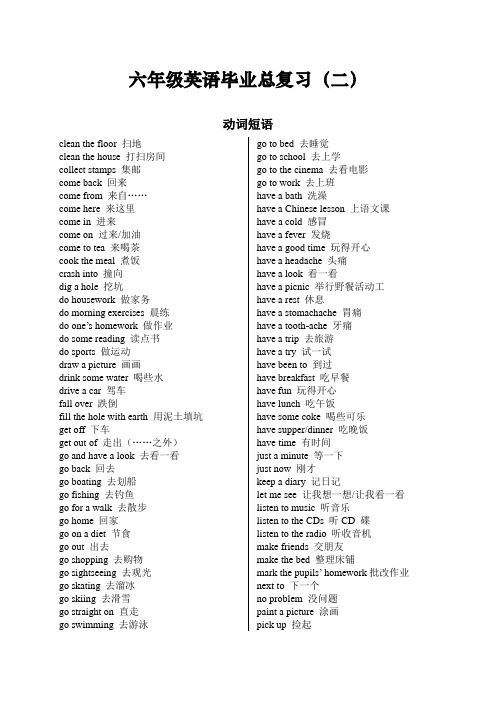
六年级英语毕业总复习(二)动词短语clean the floor 扫地clean the house 打扫房间collect stamps 集邮come back 回来come from 来自……come here 来这里come in 进来come on 过来/加油come to tea 来喝茶cook the meal 煮饭crash into 撞向dig a hole 挖坑do housework 做家务do morning exercises 晨练do one’s homework 做作业do some reading 读点书do sports 做运动draw a picture 画画drink some water 喝些水drive a car 驾车fall over 跌倒fill the hole with earth 用泥土填坑get off 下车get out of 走出(……之外)go and have a look 去看一看go back 回去go boating 去划船go fishing 去钓鱼go for a walk 去散步go home 回家go on a diet 节食go out 出去go shopping 去购物go sightseeing 去观光go skating 去溜冰go skiing 去滑雪go straight on 直走go swimming 去游泳go to bed 去睡觉go to school 去上学go to the cinema 去看电影go to work 去上班have a bath 洗澡have a Chinese lesson 上语文课have a cold 感冒have a fever 发烧have a good time 玩得开心have a headache 头痛have a look 看一看have a picnic 举行野餐活动工have a rest 休息have a stomachache 胃痛have a tooth-ache 牙痛have a trip 去旅游have a try 试一试have been to 到过have breakfast 吃早餐have fun 玩得开心have lunch 吃午饭have some coke 喝些可乐have supper/dinner 吃晚饭have time 有时间just a minute 等一下just now 刚才keep a diary 记日记let me see 让我想一想/让我看一看listen to music 听音乐listen to the CDs 听CD 碟listen to the radio 听收音机make friends 交朋友make the bed 整理床铺mark the pupils’ homework批改作业next to 下一个no problem 没问题paint a picture 涂画pick up 捡起plant trees 种树play badminton 打羽毛球play basketball 打篮球play cards 打牌play football 踢足球play games 玩游戏play table tennis 打乒乓球play tennis 打网球play the guitar 弹吉他play the piano 弹钢琴put away 放好put on 穿上put the tree into the hole 把树放进洞里ride a bike 骑自行车see a film 看电影surf the Net 上网take a message 传递信息take exercise 进行锻炼take medicine 服药take off 脱下take photos 照相turn off 关闭turn on 打开wait a moment 稍等一下wait for 等候wash clothes 洗衣服wash dishes 洗碟子watch a football match 看足球赛watch TV 看电视water the flower 浇花water the tree 浇树write a letter 写信介词短语a glass of 一杯……a lot of 许多……a map of 一幅……的地图a pair of 一双……a picture of 一幅……的画a plate of 一碟……agree with 同意……all of them 他们大家all of us 我们大家at first 首先at home 在家at last 最后at night 在晚上at school 在学校at the top of 在……顶部at the weeken 在周末be good at 擅长于……be made of 由……制造by the road 在路边by the way 顺便问问close to 靠近……different from 不同于fall down 跌倒far away from 远离from then on 从那时起from…to…从……到……full of 充满get off 下车get on 上车get out of 走出……之外get to 到达go on 继续hand in 上交help…with…帮助某人做某事in English 用英语in front of 在……前面in the afternoon 在下午in the east / south / west /north在东/南/西/北方in the evening 在晚上in the middle 在中间in the morning 在早上in the sky 在空中in time 及时in trouble 遇到麻烦It’s time to 是该……的时候了。
考试科目:六年级英语下册总复习知识点
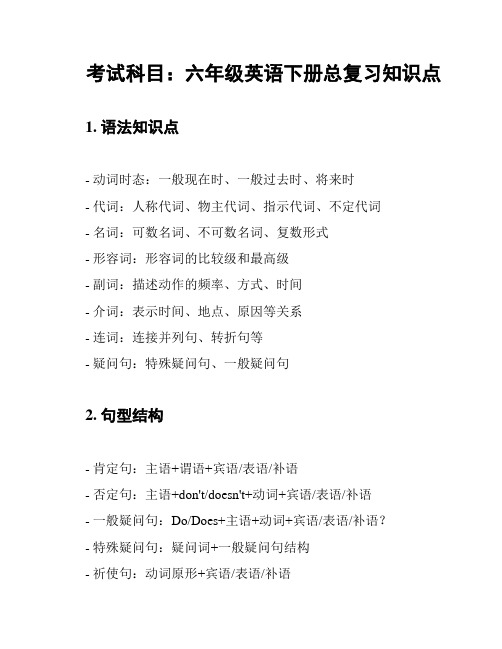
考试科目:六年级英语下册总复习知识点1. 语法知识点
- 动词时态:一般现在时、一般过去时、将来时
- 代词:人称代词、物主代词、指示代词、不定代词
- 名词:可数名词、不可数名词、复数形式
- 形容词:形容词的比较级和最高级
- 副词:描述动作的频率、方式、时间
- 介词:表示时间、地点、原因等关系
- 连词:连接并列句、转折句等
- 疑问句:特殊疑问句、一般疑问句
2. 句型结构
- 肯定句:主语+谓语+宾语/表语/补语
- 否定句:主语+don't/doesn't+动词+宾语/表语/补语
- 一般疑问句:Do/Does+主语+动词+宾语/表语/补语?
- 特殊疑问句:疑问词+一般疑问句结构
- 祈使句:动词原形+宾语/表语/补语
- 感叹句:How+形容词/副词+主语+谓语!
3. 词汇
- 日常生活词汇:家庭、学校、食物、动物、颜色、数字等- 动词:常用动词及其用法
- 形容词:描述人物特征、事物外貌的形容词
- 副词:描述动作方式、时间的副词
- 介词短语:表示时间、地点等的介词短语
4. 阅读技巧
- 理解文章主旨
- 掌握词汇的上下文应用
- 理解文章中的细节信息
- 推测词义和句意
- 根据文章内容回答问题
5. 写作技巧
- 书写正确的词汇和语法
- 使用适当的句子结构
- 保持语句连贯性
- 注意段落划分
- 表达清晰、简洁的观点
以上是六年级英语下册总复习的知识点,希望能帮助你备考顺利!加油!。
六年级总复习语法重点归纳

六年级总复习语法重点归纳一、动词原形。
1.can/can’t +动原如:I can play basketball. I can’t sing the song.情态动词后加动原。
情态动词有can should may must…2.Do/Does+…+动原如:Do you play the violin? Does she do housework?Did +…+动原如:Did you go to the farm last week?3.don’t/doesn’t +动原如:We don’t work on Sundays. He doesn’t go to school. didn‟t +…+动原如:We didn‟t see a film yesterday.4.主(非三单)+动原如:I go to school every day.5.Let’s +动原如:Let’s do some exercise.Let+人称宾格+动原6.Shall we +动原如:Shall we watch TV?7.祈使句把动原放句首如:Touch your feet with your fingers.8.help +动原如:Trees help keep the air clean.二、动词ing 形式1.拿到题目一定要先判断时态,①(时间关键词now/look/listen)They are singing now.②表明现在几点了如:It‟s 2 o‟clock, We are having a PE lesson now.③具体情境如:Don‟t sing loudly,my father is sleeping. Where is Liu Tao? He is reading in the library. We can‟t help you, we are having an English lesson.现在进行时主+be+动ing肯定句式:主语+be+动ing+其他She is singing in the music room now.否定句式:主语+be+not+动ing+其他She isn’t singing in the music room now.一般疑问句:be+主语+动ing+其他Is she singing in the music room now? Yes, she is. / No, she isn’t.特殊疑问句:疑问词+be+主语+动ing+其他What is she doing in the music room?2. like/love + 动ing 如:I like collecting stamps.3. go + 动ing 如:She often goes climbing.4.how about + 动ing 如:How about going to the cinema?介词后+ 动inglearn about 学习关于.... 后面加动词的ing形式如:I’ll learn about cooking on the Internet.5.特殊句型:do all the cooking and cleaning6.No+动ing 如:It means …No smoking‟.7.start+动ing 如:He starts drawing.8.be good at 善于后面加名词或动名词(动词ing)。
六年级英语语法毕业复习知识点

六年级英语语法毕业复习知识点六年级英语语法毕业复习知识点一一、词类动词、名词和形容词不太容易区分,如不能一眼看出,可用如下方法:先用“一(量词)”(如:一个、一张等)和这个词连起来说,如说得通,一般认为是名词;说不通再用“很”去判断,就是把“很”和为个词连起来说,说得通一般就是形容词;都说不通就是动词。
(目前我们学过的,以后可能不同)(另外一些很明显的,如人称代词、数词、情态动词等一下就可以知道)1、动词这里所说的动词是指各种动词总称,其中包括行为动词(就是我们平时总说的那种动词)、be动词、情态动词。
(1)行为动词就是我们平时上课时说的动词,表示某一动作或行为。
如:sweep、live等。
行为动词我们已学过它们的四种形式:原形、+s/es、+ed、+ing,具体判断方法如下:↗有,就加ing读句子→读该单词→认识该单词→理解意思→看有无be动词 (若是be going to 就用原形)↘没有,再看情态动词↗有,就用原形↗有,就加ed↘没有,再看有无表示过去的时间状语↗是第三人称单数就加s或es ↘没有,再看主语↘不是第三人称单数就用原形(2)be动词a、Am--was Is --was Are--were 口诀:我用am, 你用are, is用在他她它,所有复数全用are。
b、肯定和否定句 I am (not) from London. He is(not) a teacher. She is(not) in the dining room. My hairis(not) long. Her eyes are(not) small.c、一般疑问句 Am I a Chinese? Yes, you are. No, you aren’t. Are they American? Yes, they are. No, they aren’t. Is the cat fat? Yes, it is. No, itisn’t. 我们现在学过的be动词大致分两类:is、am、are为一类,一般用于一般现在时、现在进行时和一般将来时中,was和were为另一类,一般用于一般过去时。
小学六年级毕业班总复习之语法总结

前言:要学好一门外语,无非是从词、句,最后到段,词句需要积累,段由句组成,句子由词构成,因此明白词的用法很重要,但单纯的词又需要句帮助记忆,所以在讲词之前先告诉大家小学三种最常见句子结构:1.主语+谓语+宾语例如:I like English. I see you.2. 主语+谓语+副词The bus goes quickly. They walk slowly.3. 主语+be动词+形容词或名词They are students. They are young.下面就是对小学出现的词性和语法的总结。
一、名词:多用作主语和宾语。
1、可数名词与不可数名词的区别可数名词分为个体名词(如book, desk,等)和集体名词(如people,family 等)。
如果普通名词所表示的事物是不能按个数来计算的,这类名词就叫不可数名词。
如meat, water, milk, homework, time等)。
2、名词由单数形式变成复数形式的规则如下:①. 一般的名词词尾直接加-s 。
如:book → books room → rooms house → houses day → days②. 以s,ss, ch,sh, x 结尾的名词,在词尾加-es 。
如:bus → buses glass → glasses watch → watches dish → dishes box → boxes③. 以"辅音字母+y"结尾的名词,要先将y改为i再加-es。
如:city → cities body → bodies factory → factories④. 以f 或fe 结尾的名词,要将f或fe改为v再加-es。
如:half → halves leaf → leaves knife → knives wife → wives⑤. 特例[悄悄话:特例常常考,要记住。
]child → children mouse → miceman → men woman → women policeman → policemen (规律:man → men)tomato → tomatoes potato → potatoes[悄悄话:以o 结尾的名词变复数时只有这两个词加-es,其余的当然加-s喽!如:photo → photos]foot → feet tooth → teeth [悄悄话:oo变成ee。
冀教版小学英语六年级毕业总复习资料
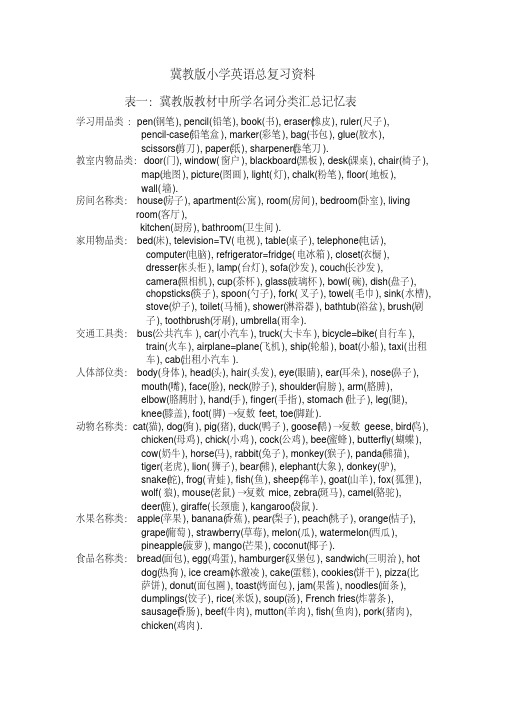
冀教版小学英语总复习资料表一:冀教版教材中所学名词分类汇总记忆表学习用品类:pen(钢笔), pencil(铅笔), book(书), eraser(橡皮), ruler(尺子),pencil-case(铅笔盒), marker(彩笔), bag(书包), glue(胶水),scissors(剪刀), paper(纸), sharpener(卷笔刀).教室内物品类:door(门), window(窗户), blackboard(黑板), desk(课桌), chair(椅子), map(地图), picture(图画), light(灯), chalk(粉笔), floor(地板),wall(墙).房间名称类:house(房子), apartment(公寓), room(房间), bedroom(卧室), living room(客厅),kitchen(厨房), bathroom(卫生间).家用物品类:bed(床), television=TV(电视), table(桌子), telephone(电话),computer(电脑), refrigerator=fridge(电冰箱), closet(衣橱),dresser(床头柜), lamp(台灯), sofa(沙发), couch(长沙发),camera(照相机), cup(茶杯), glass(玻璃杯), bowl(碗), dish(盘子),chopsticks(筷子), spoon(勺子), fork(叉子), towel(毛巾), sink(水槽),stove(炉子), toilet(马桶), shower(淋浴器), bathtub(浴盆), brush(刷子), toothbrush(牙刷), umbrella(雨伞).交通工具类:bus(公共汽车), car(小汽车), truck(大卡车), bicycle=bike(自行车), train(火车), airplane=plane(飞机), ship(轮船), boat(小船), taxi(出租车), cab(出租小汽车).人体部位类:body(身体),head(头), hair(头发), eye(眼睛), ear(耳朵), nose(鼻子), mouth(嘴), face(脸), neck(脖子), shoulder(肩膀), arm(胳膊),elbow(胳膊肘), hand(手), finger(手指), stomach (肚子), leg(腿),knee(膝盖), foot(脚)→复数feet, toe(脚趾).动物名称类:cat(猫), dog(狗), pig(猪), duck(鸭子), goose(鹅)→复数geese, bird(鸟), chicken(母鸡), chick(小鸡), cock(公鸡), bee(蜜蜂), butterfly(蝴蝶),cow(奶牛), horse(马), rabbit(兔子), monkey(猴子), panda(熊猫),tiger(老虎), lion(狮子), bear(熊), elephant(大象), donkey(驴),snake(蛇), frog(青蛙), fish(鱼), sheep(绵羊), goat(山羊), fox(狐狸),wolf(狼), mouse(老鼠)→复数mice, zebra(斑马), camel(骆驼),deer(鹿), giraffe(长颈鹿), kangaroo(袋鼠).水果名称类:apple(苹果), banana(香蕉), pear(梨子), peach(桃子), orange(桔子), grape(葡萄), strawberry(草莓), melon(瓜), watermelon(西瓜),pineapple(菠萝), mango(芒果), coconut(椰子).食品名称类:bread(面包), egg(鸡蛋), hamburger(汉堡包), sandwich(三明治), hot dog(热狗), ice cream(冰激凌), cake(蛋糕), cookies(饼干), pizza(比萨饼), donut(面包圈), toast(烤面包), jam(果酱), noodles(面条),dumplings(饺子), rice(米饭), soup(汤), French fries(炸薯条),sausage(香肠), beef(牛肉), mutton(羊肉), fish(鱼肉), pork(猪肉),chicken(鸡肉).蔬菜名称类:cabbage(卷心菜), onion(洋葱), carrot(胡萝卜), pea(豌豆), eggplant(茄子), tomato(西红柿), potato(土豆), beans(豆子).饮料名称类:juice(果汁), milk(牛奶), pop(汽水), coffee(咖啡), coke(可乐), tea(茶), water(水).家庭成员类:grandfather(祖父/外祖父), grandmother(祖母/外祖母), grandpa(爷爷/姥爷), grandma(奶奶/姥姥), father(父亲), dad(爸爸), mother(母亲),mum/mom(妈妈), brother(兄/弟), sister(姐/妹), uncle(伯/叔/舅/姑/姨父), aunt(伯/婶/舅/姑/姨母), cousin(堂/表兄弟姐妹).职业名称类:doctor(医生), nurse(护士), teacher(老师), worker(工人), driver(司机), farmer(农民), policeman(警察), pupil(小学生), student(中学生),clerk(职员), businessman(男商人), businesswoman(女商人),waiter(男服务员), waitress(女服务员), cashier(收银员), writer(作家),singer(歌手), actor(演员), dancer(舞蹈演员).服装名称类:blouse(男衬衫), shirt(女衬衫), T-shirt(T恤衫), skirt(短裙), dress(连衣裙), jacket(夹克衫), cap(太阳帽), hat(礼帽), coat(大衣), sweater(毛衣), pants (长裤), shorts(短裤), jeans(牛仔裤), sock(袜子), shoe(鞋子),sandals(露趾凉鞋), mittens=mitts(连指手套), gloves(分指手套),scarf(围巾), raincoat(雨衣), swimsuit(游泳衣).球类名称类:basketball(篮球), football(足球), volleyball(排球), tennis(网球),ping-pong=table tennis(乒乓球), badminton(羽毛球), baseball(棒球).方位名称类:east(东方),west(西方), north(北方), south(南方).公共场所类:park(公园), library(图书馆), gym(体育馆), shop(商店), store(商场), cinema=movie theatre(电影院), restaurant(餐馆), market(市场),hotel(宾馆).一日三餐类:breakfast(早餐), lunch(午餐), supper=dinner(晚餐).季节名称类:season(季节), winter(冬季), spring(春季), summer(夏季),fall=autumn(秋季).星期名称类:week(周), Sunday(星期日), Monday(星期一), Tuesday(星期二),Wednesday(星期三),Thursday(星期四), Friday(星期五), Saturday(星期六).月份名称类:month(月), January(一月), February(二月), March(三月), April(四月), May(五月), June(六月), July(七月), August(八月), September(九月),October(十月), November(十一月), December(十二月).图形名称类:shape(图形、形状), line(直线), circle(圆形), square(方形), triangle(三角形).节日名称类:New Year’s Day(新年、元旦), Spring Festival(春节), Women’s Day(妇女节), International workers’ Day=May Day(国际劳动节), Children’s教师节), National Day(国庆节),Day(儿童节), Teachers’ Day(Christmas Day(圣诞节).表二:冀教版教材中所学动词短语汇总记忆表1.play basketball(打篮球)2.play ping-pong(打乒乓球)3.play soccer(踢足球)4.最喜欢…) 5.teach sb. to do sth.(教某人做某事) 6.would like to dolike …best(sth.(愿意做某事) 7.go to the store(去商场) 8.ask sb. for help(请求某人提供帮助) 9.Excuse me.(打扰了!) 10.be ready to do sth.(准备做某事) 11.want to do sth.( 想做某事) 12.have fun=have a good time(过得愉快/玩得开心) 13.watch sb. do sth.(看某人做某事) 14.arrive at(到达) 15.have fun doing sth.(做某事开心) 16.yell for(为…..大声呼喊) 17.buy sth.for sb.(给某人买某物) 18.play hard(打地努力) 19.throw the basketball(扔篮球) 20.catch the basketball(接住篮球) 21.eat breakfas=have breakfast(吃早饭) 22.eat lunch=have lunch(吃午餐) 23.eatsupper=have supper(吃晚餐) 24.be going to do sth.(打算/准备去做某事) 25.eat porridge(喝粥) 26.wake up(醒来) 27.brush one’s teeth(刷牙) 28.go to school(去上洗脸) 32.at学) 29.put on(穿上) 30.wash one’s hands(洗手) 31.wash one’s face(梳头) 34.work hard(努力工作) 35.answer school(在学校) b one’s hair(做家庭作业) 37.take a shower(冲淋浴) questions(回答问题) 36.do one’s homework(38.take a bath(洗澡) 39.make sb. do sth.(使某人做某事) 40.Watch out!(小心!) 41.make a chart(制表格) 42.play sports(做运动) 43.ask some questions(问些问题) 44. ride a bike=ride bikes(骑自行车)45. walk to school=go to school on foot(步行去学校) 46.have/has to(必须/不得不) 47.listen to sb.(听某人讲/说) 48.clean the room(打扫房间) 49.help your family(帮助你的家人) 50.dry the dishes(擦干盘子) 51.make lunch(做午饭) 52.wash clothes(洗衣服) 53.read a book=read books(读书) 54.watch TV(看电视) 55.look at(看)56.jump in(跳进) 57.like to do sth.(喜欢做某事) 58.fly a kite/fly kites(放风筝)59.look at the flowers(赏花) 60.lie on the grass(躺在草地上) 61.take off(脱掉)62.watch the birds fly(观看鸟飞) 63.invite sb. to do sth.(邀请某人做某事) 64.stand up(站起来) 65.Hurry up!( 赶快!) 66.need to do sth.( 需要做某事) e in(进来) 68.go to the park(去公园) 69.look like(看起来像) 70. run into(撞上) 71.like doing sth.(喜爱做某事) 72.like swimming(喜爱游泳) 73.learn English(学英语) 74.teach English(教英语) 75.drive the car to school(开车去学校) 76.listen to the radio(听收音机) 77.go on a trip/go on trips(去旅行) 78. fly home/come back home by plane(乘飞机回家) 79.say hello to sb.(向某人问好) 80. call sb. on the phone(给某人打电话) 81.walk slowly(走得慢) 82. walk quickly(走得快) 83.play cards(打牌) 84.arrivein(到达) 85.go for a walk(散步) 86.walk down the street(沿着街走) 87.take a picture=take pictures(拍照) 88.go shopping(购物) 89.get wet(变湿) 90.be/get ready for(为……做好准备) 91.make a snowman=make snowmen(堆雪人) 92.Look out!(小心)93.walk forwards/backwards(向前走/向后走) 94.turn around(转圈)95. all down(摔倒) 96.flowers bloom(花开) e on (过来/加油!) 98.blow…off(把……从……上吹落))99. look out the window(朝窗子外面看) 100.go inside(进来) 101.go outside(出去) 102.put up(装扮) 103.send a card/send cards(寄贺卡) 104.sing asong/sing songs(唱歌)105.bring gifts(带来礼物)106. walk to the park(步行去公园)107.eat eggs(吃鸡蛋)108.bring toys(带来玩具)109.help sb. with sth.(某人做某事) 110.Christmas gifts(圣诞礼物)表三:冀教版教材中所学过的不规则动词的过去式分类记忆表a.完全不规则:am,is-was, are-were, do/does-did, go-went, see-saw, say-said, have/has-had, fly-flew, speak-spoke, buy-bought, bring-brought, think-thought, teach-taught, eat-ate, lie-lay, can-could, will-would.b.改变其中的元、辅音字母:give-gave, get-got, forget-forgot, come-came, run-ran, sing-sang, write-wrote,draw-drew, drink-drank, ride-rode, swim-swam,shine-shone, find-found, win-won, lose-lost, make-made.c.原形和过去式同形:read-read, put-put, hit-hit, hurt-hurt, cost-cost.表四:冀教版教材中所学的对应词和反义词汇总记忆表boy(男孩)-girl(女孩), man(男士)-woman(妇女), brother(兄弟)-sister(姐妹),father(父亲)-mother(母亲), dad(爸爸)-mum(妈妈), grandfather(祖父)-grandmother (祖母), uncle(叔叔)-aunt(婶婶), husband(丈夫)-wife(妻子), day(白天)-night(夜晚), morning(早上)-afternoon(下午), east(东方)-west(西方), north(北方)-south(南方),big(大的)-small(小的), old(旧的)-new(新的), old(老的)-young(少的), tall(高的)-short(矮的), long(长的)-short(短的), left(左面)-right(右面), wrong(错误的)-right(正确的), black(黑色的)-white(白色的), good(好的)-bad(坏的), happy(高兴地)-sad(悲伤的), dirty(脏的)-clean(干净的), heavy(重的)-light(轻的), hungry(饥饿的)-full(饱的), cold(冷的)-hot(热的), warm(温暖的)-cool(凉爽的), fat(胖的)-thin(瘦的), dry(干的)-wet(湿的), hard(难的)-easy(容易得), quiet(安静的)-loud(大声的), quick(快的)-slow(慢的), far(远的)-near(近的), high(高的)-low(低的), strong(强壮的)-weak(虚弱的), healthy(健康的)-sick(有病的), different(不同的)-same(相同的), expensive(昂贵的)-cheap(便宜的), here(这儿)-there(那儿),late(迟的)-early(早的), first(首先)-finnally(最后), always(总是)-never(从来不), inside(里面)-outside(外面), up(向上)-down(向下), quickly(快地)-slowly(慢地), quietly(安静地)-loudly(大声地), well(好)-badly(坏), fast(快的、快地)-slow(慢的)/slowly(慢地), this(这个)-that(那个), these(这些)-those(那些), come(来)-go(去), yes(是)-no(不是), stand(站)-sit(坐), open(打开)-close(关上), ask(问)-answer(答), borrow(借来)-lend(借出), bring(带来)-take(带走), buy(买)-sell(卖),cry(哭)-laugh(笑), teach(教)-learn(学), better(更好)-worse(更坏), before(在……之前)-after(在……之后), above(在……以上)-below(在……以下).表五:冀教版教材中所学的同音词汇总记忆表buy(买)-by(乘……)-bye(再见), two(二)-too(也)-to(到) I(我)-eye(眼睛),four(四)-for(为了), hi(嘿)-high(高), know(知道)-no(不), hear(听见)-here(这儿),their(他们的)-there(那儿), meet(碰见)-meat(肉), sun(太阳)-son(儿子), see(看见)-sea(大海), hour(小时)-our(我们的), write(写)-right(右面的/正确的), weak(虚弱的)-week(周), new(新的)-knew(know的过去式), one(一)-won(win的过去式), aren’t(are和not的缩写)-aunt(婶/舅/姑/姨母), its(它的)-it’s(it和is的缩写), Miss(小姐)-miss(想念), May(五月)-may(可以).表六:冀教版教材中常用交际用语汇总记忆表问候:Hi! Hello! Good morning/afternoon/evening! Nice to meet you! Nice to meet you, too. A:How are you? B: Fine,thank you./Very well,thank you.介绍:My name is ____. / I am a student. / I’m from Canada. /This is ______.告别:Good-bye! /Bye! /Bye-bye!Good night!See you later /tomorrow!l right. / You are感谢:Thank you(very much)/ Thanks a lot. -That’s OK. / That’s Alwelcome. / Not at all.道歉:-Sorry. / I am sorry. -That’s OK. / It’s all right.邀请Would you like to go for a walk? / Will /Would you come to my birthdayparty?-Sure. / No, thanks.请求允许:-May I go on a trip to Beijing?-Yes, you may. / No, you may not. / Sure. / Certainly.-Can I use your pencil?-Of course, you can.祝愿与祝贺:Have a lovely day! / Good luck! / Happy New Year! / Merry Christmas! You, too. / The same to you. -Happy birthday!-Thank you.约会:A: Would you like to play with me this afternoon? B: Yes. When? A: At12:00.B: See you then.打电话:A: Hello! May I speak to Mr. Wood?B: Yes, just a moment, please.A: Hello! Is Kim there? B: No /Sorry, can I take a message.a就医:A: What’s the matter?/What’s wrong with you? B:I hurt my finger. I have headache /stomachache.就餐:A:Would you like something to eat / drink? B: Yes. I would like rice and chicken.A: What would you like? B:I would like some tea.A: Would you like some more dumplings? B: Yes, please. / No, thanks / thank you.A: May I have some more soup? B: It’s delicious. Sure / OK.购物:A: Can/May/I help you? B: Yes. I want to buy a dress, please.A:Here you are. B: May I try it on? A: Ok /Sure. B: It’s too big/small.A:This one is just right. B: How much is it/ are they? A:One hundred yuan /dollars.B: It’s too expensive. /It’s very cheap. But I like it. I’ll take it.问路:A:Excuse me. Do you know where is the________?B: Yes. Go straight down the street. Turn left /turn right.提供帮助:A: Can I help you? /May I help you? B: Yes, please. / No, thanks.询问对方姓名:A:What’s your name?B:My name is ____.A:What’s his/ her name?B: His /her name is ___.A:Who are you? B: I’m _____.询问在那儿:A: Where is the book? B:It is on the desk.A:Where is Jenny? B:She is behind Danny.询问是什么:A:What is it? B: It is a marker.询问颜色:A:What colour is the sweater? B:It is black.询问时间:A:What time is it? B: It’s seven.A:When is Teachers’Day?B: It’s on September tenth.询问地址和住址:A:Where are you from? B: I’m from Canada.A:What’s you r address? B: My address is 111 Park Road.A:Where do you live? B: I live in an apartment.询问日期:A:What day is today? B: It’s Monday.A:What day is tomorrow? B: It’s Tuesday.A:What day was yesterday? B: It was Sunday.A:What’s the date?B: It’s October 19th.询问对方正做什么:A:What are you doing? B: I’m writinging a letter.A:What is he/ she doing? B: He /she is playing.A:What are they doing? B: They are learning English.询问对方做过些什么:A:What did you do? B: I went to the gym.A:What did they do? B: They played basketball.询问对方将要做什么:A:What will you do? B: I will fly a kite.A:What is he going to do? B: He is going to learn English.询问对方最喜欢的事物:A:What’s your favourite colour /food / fruit /shape/ season? B: My favourite colour is white.询问数量:A:How many pencils do you have? B: I have 10 pencils.A:How many birds can you see? B: I can see 20 birds.A:How many days are there in a week? B: There are seven days in a week.询问价钱:A:How much is the scarf? B: Twenty yuan.A:How much are the runners? B: They are thirty dollars.谈论天气气温:A:How’s the weather today?B: It’s sunny/cloudy/windy/snowy. A:What’s the temperature?B: It’s _______degrees.询问年龄:A:How old are you? B:I’m fourteen years old.A:How old is she/ he? B: He/ She is twenty .询问身高:A:How tall are you? B: I’m 1.6 metres tall.A:How tall is she/ he? B: She/ he is 1.7 metres tall.询问事情发生的频率:A:How often do you play basketball? B: About once a week.A:How often does my mother clean my bedroom? B: Twice a day.询问事情距离长短:A:How long is the trip? B: About two hours to Beijing.A:How long does he go to school a day ? B: Eight hours.询问路程的远近:A:How far is it from here to Beijing? B: It’s one hundred kiliometres.询问对方感觉怎么样: A:How do you feel? B: I feel sad.询问对方是谁,问谁在做些什么?A:Who is this? B: This is a man.A:Who is talking? B: Danny is talking.询问东西是谁的:A:Whose hat is this? B: This is my hat /mine.询问原因:A: I like to eat vegetables. Why? B:Because it’s good for your health.。
毕业总复习之各册知识点(六年级上册)
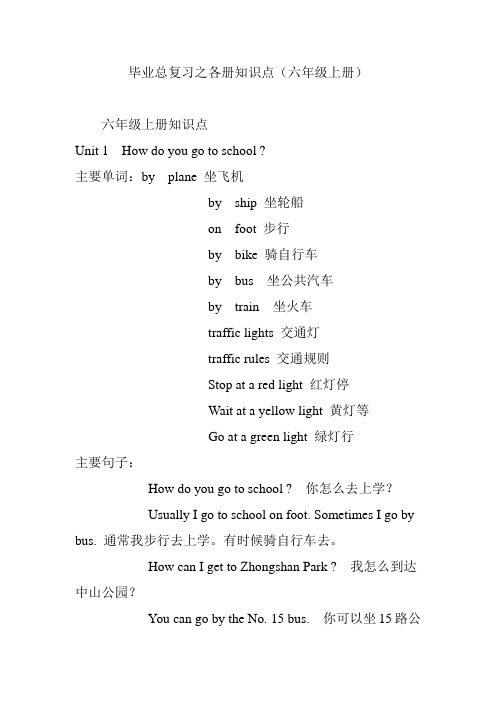
毕业总复习之各册知识点(六年级上册)六年级上册知识点Unit 1 How do you go to school ?主要单词:by plane 坐飞机by ship 坐轮船on foot 步行by bike 骑自行车by bus 坐公共汽车by train 坐火车traffic lights 交通灯traffic rules 交通规则Stop at a red light 红灯停Wait at a yellow light 黄灯等Go at a green light 绿灯行主要句子:How do you go to school ? 你怎么去上学?Usually I go to school on foot. Sometimes I go by bus. 通常我步行去上学。
有时候骑自行车去。
How can I get to Zhongshan Park ? 我怎么到达中山公园?You can go by the No. 15 bus. 你可以坐15路公共汽车去。
知识点:1、There are many ways to go somewhere.到一个地方去有许多方法。
这里的ways一定要用复数。
因为there are是There be句型的复数形式。
2、get to到达.关本单元我们还要学习与get相关的短语:get on 上车get off下车3、on foot 步行乘坐其他交通工具大都可以用介词by…, 但是步行只能用介词on 。
4、go to school 的前面绝对不能加the,这里是固定搭配。
5、USA 和US 都是美国的意思。
另外America也是美国的意思。
6 go to the park 前面一定要加the。
如果要去的地方有具体的名字,就不能再加the ,如果要去的地方没有具体名字,由要在前面加the. go to school除外。
7、How do you go to …? 你怎样到达某个地方?如果要问的是第三人称单数,则要用: How doeshe/she…go to …?8、反义词:get on (上车)---get off (下车)near (近的)—far (远的)fast (快的)—slow (慢的)because (因为)—why (为什么)same (相同的)—different (不同的)9、近义词:see you---goodbye sure---certainly---of course10、频度副词:always 总是,一直usually 通常often 经常sometimes 有时候never 从来不Unit 2 Where is the science museum?主要单词:library 图书馆post office 邮局hospital 医院cinema 电影院bookstore 书店science museum 科学博物馆turn left 向左转turn right 向右转go straight 直行north 北south 南east 东west 西主要句子:Where is the cinema, please? 请问电影院在哪里?It’s next to the hospital. 它与医院相邻。
新PEP六年级英语总复习及练习精选全文完整版

可编辑修改精选全文完整版六年级英语毕业总复习一单词名词动词形容词可数不可数原型进行式过去式第三人称单数原型比较级apple water do doing did does fat fatter(将来时、一般现在时)(一般现在时)单数复数apple apples一、定义:名词可以分为可数名词和不可数名词,不可数名词没有单复数,一律看作单数。
二、可数名词:分为单数和复数⑴单数:以元音音标a e i o u 开头的单数用an(一个),其他用a(一个)或者one +单数复数:some(一些)加复数或者不可数名词;或者大于1的具体数字+复数⑵可数名词单数→复数的变化规则:三、不可数名词:以下词为常为不可数名词,他们的复数形式就是他们本身。
water 水milk牛奶tea 茶rice米饭juice 果汁bread面包meat 肉四、人称代词:be 动词am , is , are的选择: 单数用is , 复数用are,I 用am , you 用are.练习题一、选择a或an或some.pen bag apple big applebananas orange books water二、写出下列各词的复数.watch _______ child _______ day________ foot________ book_______ sheep ______ box_______ peach______ man______fish _______ paper_______三、选择:1、There on the wall .They are very beautiful.A. are photoesB. are photos2、That’s book.A. anB. a3、There some in the river.A. are, fishesB. are ,fish4. Would you like _______ ,please?A. some watersB. some water5、Do you want to drink much ?A、a milkB、milk四、选择be(am is are ) 填空。
(完整版)小学六年级人教版英语总复习及知识点
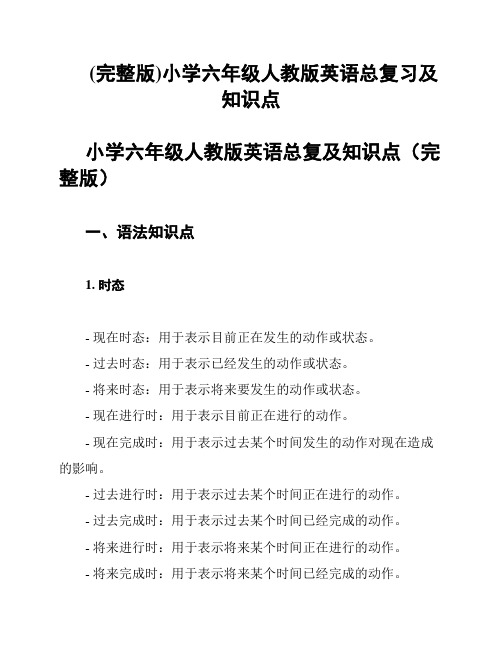
(完整版)小学六年级人教版英语总复习及知识点小学六年级人教版英语总复及知识点(完整版)一、语法知识点1. 时态- 现在时态:用于表示目前正在发生的动作或状态。
- 过去时态:用于表示已经发生的动作或状态。
- 将来时态:用于表示将来要发生的动作或状态。
- 现在进行时:用于表示目前正在进行的动作。
- 现在完成时:用于表示过去某个时间发生的动作对现在造成的影响。
- 过去进行时:用于表示过去某个时间正在进行的动作。
- 过去完成时:用于表示过去某个时间已经完成的动作。
- 将来进行时:用于表示将来某个时间正在进行的动作。
- 将来完成时:用于表示将来某个时间已经完成的动作。
2. 语法结构- 名词:用于表示人、动物、物体、地点等。
- 动词:用于表示动作或状态。
- 形容词:用于描述名词的特征或状态。
- 副词:用于修饰动词、形容词或其他副词。
- 介词:用于表示位置、时间或关系等。
- 代词:用于替代名词。
- 数词:用于表示数量。
- 冠词:用于限定名词的范围。
- 连词:用于连接词语、短语或句子。
3. 句子结构- 主语:句子中执行动作或承受动作的人或事物。
- 谓语:句子中说明主语动作或状态的部分。
- 宾语:句子中接受动作的人或事物。
- 定语:用于修饰名词或代词的成分。
- 状语:用于修饰动词、形容词、副词或整个句子的成分。
- 表语:用于说明主语的状态或特征的部分。
二、总复内容1. 单词- 请根据教材中的单词表,复并牢记相关的单词拼写和意思。
2. 句子- 复教材中的对话和句子,理解并掌握其基本意思和用法。
3. 对话- 复教材中的对话,掌握其中的日常生活用语和表达方式。
4. 语法- 复教材中的语法知识点,加深对时态、语法结构和句子成分的理解。
三、研究方法1. 多听多说- 多听英语教材、歌曲或英语广播,提高听力水平。
- 多说英语,练口语表达和语音准确性。
2. 多读多写- 多读英语教材、故事书等,提高阅读理解能力。
- 多写英语作文,锻炼自己的写作能力和语法运用。
小学毕业总复习单词表动词形式
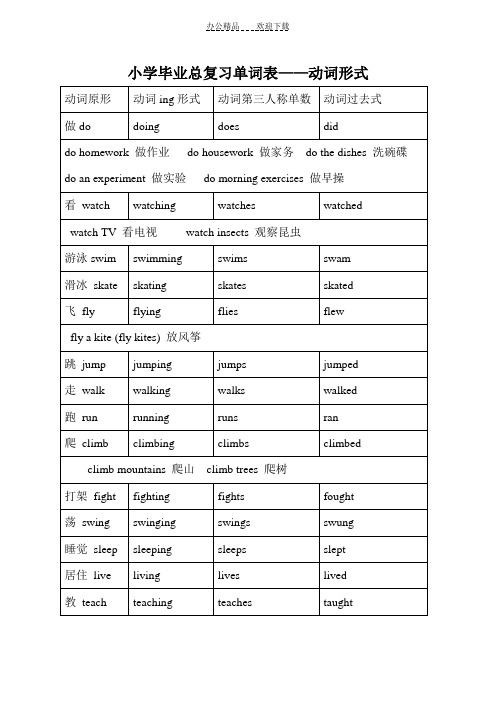
going
goes
went
go to school上学go home回家go to bed睡觉go hiking去远足
go to the cinema去看电影go straight直走go skiing去滑雪
go to work去上班go on a big trip去旅行go back
go shopping买东西go ice-skating去滑冰go on a big trip去旅行
读书read
reading
reads
read
read a book (read books)读书read a magazine读杂志
read newspapers看报纸
买buy
buying
buys
bought
buy presents买礼物
划row
rowing
rows
rowed
row a boat划船
小学毕业总复习单词表——动词形式
动词原形
动词ing形式
动词第三人称单数
动词过去式
做do
doing
does
did
do homework做作业do housework做家务do the dishes洗碗碟
do an experiment做实验do morning exercises做早操
看watch
watching
plant trees种树plant flowers种花
画画draw
drawing
draws
drew
draw pictures
take
taking
takes
took
take pictures (photos)照相take a trip去旅行take off脱下
小学六年级的毕业考试英语总复习:动词短语、介词短语和其他词组
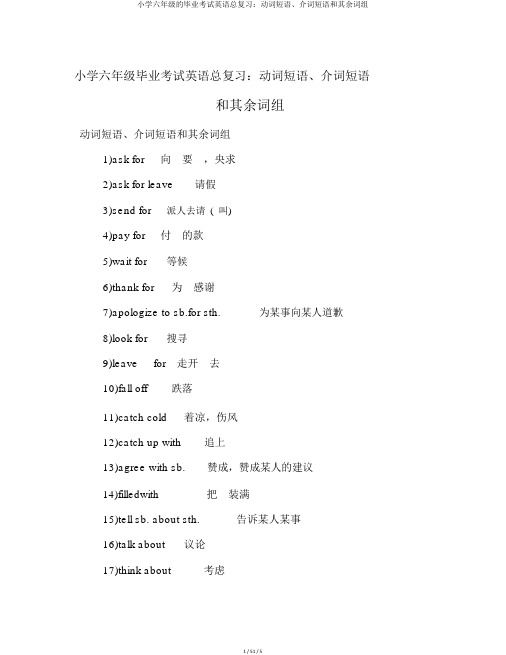
小学六年级毕业考试英语总复习:动词短语、介词短语和其余词组动词短语、介词短语和其余词组1)ask for向要,央求2)ask for leave请假3)send for派人去请(叫)4)pay for付的款5)wait for等候6)thank for为感谢7)apologize to sb.for sth.为某事向某人道歉8)look for搜寻9)leave for走开去10)fall off跌落11)catch cold 着凉,伤风12)catch up with 追上13)agree with sb. 赞成,赞成某人的建议14)filledwith 把装满15)tell sb. about sth. 告诉某人某事16)talk about 议论17)think about 考虑18)worry about 担⋯⋯19)look after 照料20)run after 追赶,跟在后边跑21)read after 跟⋯⋯22)smile at ⋯⋯微笑23)knock at 敲( 、窗 )24)shout at ⋯⋯大喊( 嚷)25)throw away 扔掉26)work hardat 努力做⋯⋯27)wait in line 排等候28)change⋯into ⋯成29)hurry into ⋯匆促入30)run into ⋯跑31)hear of 听32)think of ,考33)catch hold of 抓住34)instead of 代替⋯⋯35)hand in交上来36)stay in bed卧病在床37)hear from收到⋯⋯来信38)at once立刻39)at last 最后40)at first 开初,第一41)at the age of 在岁时42)at the end of 在之末43)at thebeginning of在之初44)at the foot of 在脚下45)at the sametime 同时46)atnight/noon 在夜里 / 中午47)with one's help在某人的协助下,因为某人的协助48)with the help of 在的协助下49)with asmile 面带笑容50)with one's own eyes 亲眼看见51)after awhile 过了一会儿52)from now on 从现在起53)from then on 从那时起54)f0r example 比方55)far awayfrom 远离56)from morningtill night 从早到晚57)by and by 不久58)by airmail 寄航空邮件59)by ordinarymail 寄平信60)by theway顺便说61)by thewindow在窗边62)by the end of到底为止63)little by little 逐渐地64)in all总合65)in fact 事实上66)in one's twenties 在某人二十几岁时67)in ahurry 匆促68)in the middleof 在中间69)in no time (ina minute) 立刻,很快70)in time (ontime) 即时71)in public 公众,公开地72)in orderto 为了73)in frontof 在前面74)in thesun 在阳光下75)in theend 最后,终于76)insurprise 惊诧地77)in turn 依次78)of course 自然79)a bit(of) 有一点儿80)a lot of 很多81)on one's way to 某人在去的路上82)on foot 步行,走路83)a talk on space 一个关于太空的报告84)on the other hand 另一方面85)at/on the weekend 在周末86)on the left(right) 在左( 右)边87)on the otherside of 在另一边88)on the radio经过收音机(无线电广播)89)to one's joy使快乐的是90)to one's surprise使惊讶的是。
六年级毕业总复习--动词

情况
一般情况 以-s/-x/sh/ch/-o 结尾 辅音字母+y结尾 元音字母+y结尾
构成法
词尾+s 词尾+es 改y为i,+es 词尾+s
例词
get-gets live-lives go-goes wash-washes watch-watches fly-flies study-studies play-plays pay-pays
reads (read) magazines in the library. 3.Nina watches (watch) TV on the weekends. 4.My parents often clean (clean) the room together . 5.My friend has (have) two sisters. 6. I have (have) six comic books. 7. Judy usually washes(wash) clothes by herself.
选择题 ( A)1. Is your mum cook dinner? Yes, she
A. is A. I’m B. are B. I am B. Are C. am
. .
(B )2. Are you speaking to your teacher? Yes,
C. I’m not C. Is
( B)3.
B: Yes,I did.
动词过去式分为规则变化和不规则变化两种。
规则动词的过去式变化如下:
(1)一般情况下,动词词尾加 -ed ,如: work--worked play--played walk-- walked
(2)以不发音的 -e 结尾动词,动词词尾加 -d,如: live--lived move--moved hope--hoped (3)以辅音字母 + y结尾的动词,把-y变为-i 再加-ed, 如: studied tried cried carried 母,再加 -ed,如: stopped begged dropped planned
六年级英语重点知识总结
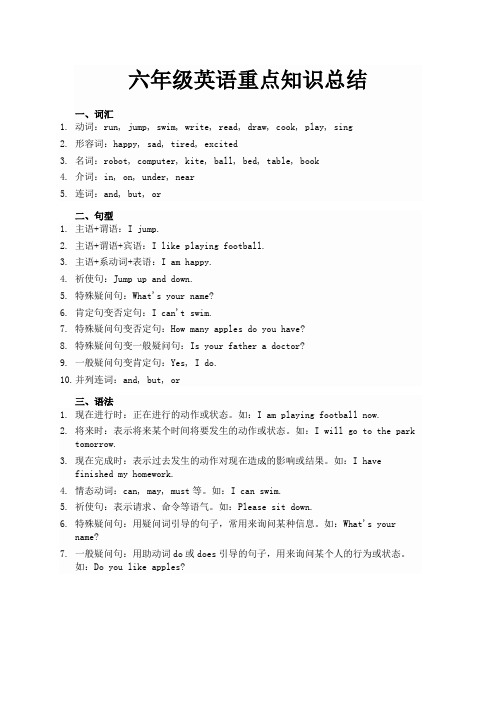
六年级英语重点知识总结一、词汇1.动词:run, jump, swim, write, read, draw, cook, play, sing2.形容词:happy, sad, tired, excited3.名词:robot, computer, kite, ball, bed, table, book4.介词:in, on, under, near5.连词:and, but, or二、句型1.主语+谓语:I jump.2.主语+谓语+宾语:I like playing football.3.主语+系动词+表语:I am happy.4.祈使句:Jump up and down.5.特殊疑问句:What's your name?6.肯定句变否定句:I can't swim.7.特殊疑问句变否定句:How many apples do you have?8.特殊疑问句变一般疑问句:Is your father a doctor?9.一般疑问句变肯定句:Yes, I do.10.并列连词:and, but, or三、语法1.现在进行时:正在进行的动作或状态。
如:I am playing football now.2.将来时:表示将来某个时间将要发生的动作或状态。
如:I will go to the parktomorrow.3.现在完成时:表示过去发生的动作对现在造成的影响或结果。
如:I havefinished my homework.4.情态动词:can, may, must等。
如:I can swim.5.祈使句:表示请求、命令等语气。
如:Please sit down.6.特殊疑问句:用疑问词引导的句子,常用来询问某种信息。
如:What's yourname?7.一般疑问句:用助动词do或does引导的句子,用来询问某个人的行为或状态。
如:Do you like apples?。
新版小学英语动词汇总
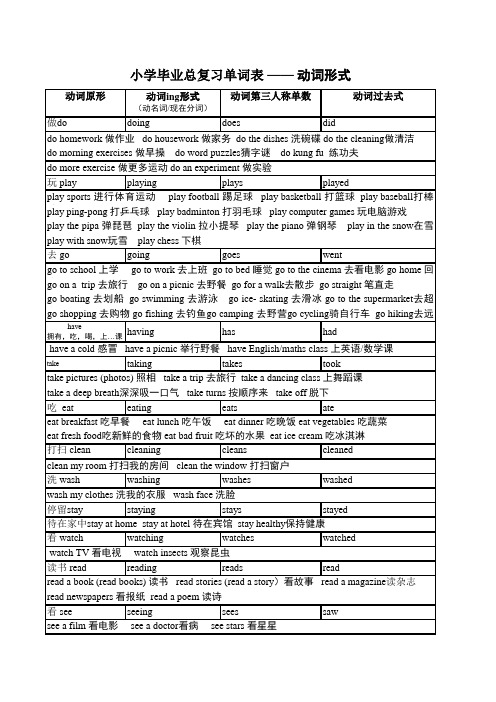
动词原形动词ing 形式(动名词/现在分词)动词第三人称单数动词过去式做do doingdoes did 玩 play playing plays played去 go going goes wenthave 拥有,吃,喝,上…课having has had take taking takestook 吃 eat eating eats ate打扫 clean cleaning cleans cleaned洗 wash washing washes washed停留stay staying stays stayed看 watch watching watches watched读书 read reading reads read看 see seeing sees saw小学毕业总复习单词表 —— 动词形式待在家中stay at home stay at hotel 待在宾馆 stay healthy 保持健康watch TV 看电视 watch insects 观察昆虫read a book (read books) 读书 read stories (read a story )看故事 read a magazine 读杂志read newspapers 看报纸 read a poem 读诗see a film 看电影 see a doctor 看病 see stars 看星星take pictures (photos) 照相 take a trip 去旅行 take a dancing class 上舞蹈课take a deep breath 深深吸一口气 take turns 按顺序来 take off 脱下eat breakfast 吃早餐 eat lunch 吃午饭 eat dinner 吃晚饭 eat vegetables 吃蔬菜eat fresh food 吃新鲜的食物 eat bad fruit 吃坏的水果 eat ice cream 吃冰淇淋clean my room 打扫我的房间 clean the window 打扫窗户wash my clothes 洗我的衣服 wash face 洗脸play with snow 玩雪 play chess 下棋go to school 上学go to work 去上班go to bed 睡觉go to the cinema 去看电影go home 回家 go straight 直走 go for a walk 散步 go cycling 去骑自行车 go hiking 去远足go on a trip 去旅行 go on a picnic 去野餐 go for a walk 去散步 go straight 笔直走go boating 去划船go swimming 去游泳go ice-skating 去滑冰go to the supermarket 去超市g o shopping 去购物go fishing 去钓鱼go camping 去野营go cycling 骑自行车go hiking 去远足 have a cold 感冒 have a picnic 举行野餐 have English/maths class 上英语/数学课 have a race 赛跑比赛 have breakfast/lunch/dinner 吃早/中/晚饭, have some juice 喝点饮料do homework 做作业 do housework 做家务 do the dishes 洗碗碟 do the cleaning 做清洁do morning exercises 做早操 do word puzzles 猜字谜 do kung fu 练功夫do more exercise 做更多运动 do an experiment 做实验play sports 进行体育运动play football 踢足球play basketball 打篮球play baseball 打棒球p lay ping-pong 打乒乓球 play badminton 打羽毛球 play computer games 玩电脑游戏play the pipa 弹琵琶play the violin 拉小提琴play the piano 弹钢琴play in the snow 在雪里玩(动名词/现在分词)睡觉 sleepsleeping sleeps slept 骑 ride riding ridesrode 游泳swim swimming swimsswam 划冰ice-skate ice-skating ice-skatesice-skated 制作 make making makes made伤害 hurt hurting hurts hurt买 buy buying buys boughtget getting gets got探望、参观 visit visiting visits visited唱歌 sing singing sings sang跳舞 dance dancing dances danced煮 cook cooking cooks cooked听listen listening listens listened爬 climb climbing climbs climbed画画 draw drawing draws drew学习 study studying studies studied学习 learn learning learnslearned / leant 用 use using uses used穿 wear wearing wears weared转turn turning turns turned停止stop stopping stops stoppeduse a computer(computers) 用电脑wear warm clothes 穿暖和的衣服 wear glasses 戴眼镜 wear shoes 穿鞋turn left at …在…向左转turn right at …在…向右转turn at the traffic lights 在交通灯处转弯cook Chinese food 做中国食物 做饭 cook dinner (cook the meals)听音乐 listen to music 听我 listen to meclimb mountains 爬山 climb trees 爬树draw pictures 画画 draw cartoons 画卡通study Chinese 学习中文 study in the school 在学校学习learn English 学习英语 learn Chinese 学中文make a kite (make kites)制作风筝 make a snowman 堆雪人 make the bed 铺床make a puppet 做木偶 make mooncakes 做月饼hurt my foot/leg/hand 伤了我的脚/腿/手buy gifts 买礼物 buy presents 买礼物 buy a postcard 买明信片 buy a magazine 买杂志get up 起床 get on 上车 get off 下车 get to 到达 get there 到达那儿 get together 聚会visit my grandparents 看望我的外祖母 visit the Great Wall 参观长城sing English songs 唱英文歌ride a bike 骑自行车 ride a horse 骑马(动名词/现在分词)飞 fly flying flies flewfly a kite (fly kites) 放风筝跳 jump jumping jumps jumped走 walk walking walks walked跑 run running runs ran停止stop stopping stops stopped保持keep keeping keeps keptkeep to the right 靠右 keep your desk clean 保持你的课桌干净居住 live living lives lived教 teach teaching teaches taught teach English讲speak speaking speaks spoken speak English 讲英语 speak Chinese 讲汉语浇水 water watering waters watered water (the) flowers 浇花种植 plant planting plants planted plant trees 种树 plant flowers 种花数 count counting counts counted count to ten数到十收集 collect collecting collects collected collect insects 收集昆虫 collect stamps 集邮 collect leaves 收集树叶摘、拾 pick picking picks pickedpick up apples 采摘苹果 pick up leaves 采摘树叶喝 drink drinking drinks drank喝水 drink water drink juice 喝果汁说talk talking talks talkedtalk quietly 小声说话工作work working works worked 在…工作 work in (the school, the hospital, the factory)来come coming comes camecome back 回来追赶chase chasing chases chased感觉 feel feeling feels feltfeel good 感觉好 feel better 感觉更好减速slow down slowed down slowing down slowed down 写 write writing writes wrotewrite a report 写报告 write a letter (单数) write letters(复数)写信写邮件:write an e-mail (单数) write e-mails (复数)打扫 sweep sweeping sweeps swept sweep the floor 扫地set setting sets set摆饭桌 set the table放 put putting puts put收拾衣服 put away the clothes put on the clothes穿上衣服回答 answer answering answers answered 捉 catch catching catches caught catch butterflies 捉蝴蝶。
- 1、下载文档前请自行甄别文档内容的完整性,平台不提供额外的编辑、内容补充、找答案等附加服务。
- 2、"仅部分预览"的文档,不可在线预览部分如存在完整性等问题,可反馈申请退款(可完整预览的文档不适用该条件!)。
- 3、如文档侵犯您的权益,请联系客服反馈,我们会尽快为您处理(人工客服工作时间:9:00-18:30)。
动词原形 第三人称单数形式
过去式
过去分词 现在分词
1. 动词原形 是指动词未经过变化的形式。
如:have/go/learn/swim等
I go to school on foot.
We live in Shanghai.
They like bananas.
2. 第三人称单数形式 动词一般现在时的第三人称单数形式的构成和名词复 数构成法相似。he/she/it….
B to school on foot. 1. Mary ____
A. go B. goes C. going
C. flys kites
A on Sundays. Mike and John usually _____
A.fly kites B. flies kites A.ride B. rides C. riding 3.My mother often _____a B bike to work.
4. My mother ____ is __________ cooking (cook) fish now.
5. They _____ are ________ (water) the flowers now. watering 6. We ______ dinner now. are _______(have) having
reads (read) magazines in the library. 3.Nina watches (watch) TV on the weekends. 4.My parents often clean (clean) the room together . 5.My friend has (have) two sisters. 6. I have (have) six comic books. 7. Judy usually washes(wash) clothes by herself.
用所给的动词的正确形式填空。
1. The boy _____ is _________ drawing (draw) a picture now.
2.I ____ am _____ reading
(read) English now.
3.He ______ is _______ going (go) to the park now.
C my homework after school every day. 4. I ______
A.did B. does A. swam C. do C. swim
C in the river in summer. 5.They ____
B. swimming
1.They often
go
(go) to school on foot .
wash run come
fly
ran came flew
4. 现在分词 现在进行时表示正在发生的事情或动作。 常和now,look,listen连用。 动词要用现在分词形式。 如:We are listening to music now. 我们现在正在听音乐。 Listen! He is playing the piano. 听!他正在弹钢琴。
请用动词正确形式填空。
1. I _________ had (have) a happy birthday yesterday.
2. --______ Did she ______( play play) her guitar yesterday?
--No, she _________. didn’t 3. --What _____ did Tom _____ do (do) on Saturday evening? --He watched ________(watch) TV and ______( read read) a book. 4. They _______( went go) hiking yesterday morning. 5. She ___________( didn’t visit not visit) her aunt last weekend.
注:不规则动词的过去式变化规律性不强,须多加记忆。 如: go – went
make – made get - got buy - bought come - came fly-flew is/am-was are-were
take– took swim – swam sing - sang have - had leave- left see-saw do-did read-read
A. having B. are C. are having
( (
A )7. Look, it ____ outside.
A. snowing B. is playing C. are playing an “ABC”song. C.are sing
B)8. Listen! The boys
A. sing B. are singing
现在分词构成有一定的规律。
情况
一般情况
构成法
词尾+ing
例词
go-going do-doing 以不发音字母e结 先去掉e,再+ing make-making 尾的动词 take-taking 末尾只有一个辅 双写这个辅音字 sit-sitting 音字母的重读闭 母+ing run-running 音节动词 swim-swimming 以ie结尾的动词 改ie为y,在+ing tie-tying die-dying
2.Usually Sarah
3. 过去式 表示过去了的动作或事件。 表示过去时间的单词有:yesterday/last weekend/in 2008等 例句: A: What did you do last weekend?
B:I played football.
A: Did you read books?
选择题 ( A)1. Is your mum cook dinner? Yes, she
A. is A. I’m B. are B. I am B. Are C. am
. .
(B )2. Are you speaking to your teacher? Yes,
C. I’m not C. Is
( B)3.
A. Am
your classmates playing games?
( B)4. He
A. am not
climbing mountains. B. isn’t C. aren’t
(
A )5. I
a book now. C. reading
A. am reading B. is reading
( C )6. We _______an English class now.
请写出下列动词的过去式:
walk eat look see buy
walked ate looked
sing
saw bought sang
got take took read read go went learn learned swim swam
get
washed clean cleaned climb climbed
现在进行时的句子结构: 1.be + 动词现在分词(即:动词-ing形式), be + doing 是一个整体,不能分开。 2.be 随着主语的变化而变化,doing的变化规则根
据现在分词的变化规律来定。
I am, you are(你), he /she is, they are
we are, you are(你们),
情况
一般情况 以-s/-x/sh/ch/-o 结尾 辅音字母+y结尾 元音字母+y结尾
构成法
词尾+s 词尾+es 改y为i,+es 词尾+s
例词
get-gets live-lives go-goes wash-washes watch-watches fly-flies study-studies play-plays pay-pays
B: Yes,I did.
动词过去式分为规则变化和不规则变化两种。
规则动词的过去式变化如下:
(1)一般情况下,动词词尾加 -ed ,如: work--worked play--played walk-- walked
(2)以不发音的 -e 结尾动词,动词词尾加 -d,如: live--lived move--moved hope--hoped (3)以辅音字母 + y结尾的动词,把-y变为-i 再加-ed, 如: studied tried cried carried (4)以一个辅音字母结尾的重读闭音节动词,双写词尾 辅音字母,再加 -ed,如: stopped begged dropped planned
